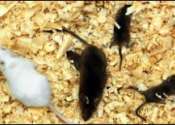New scientific analysis shines a light on Otzi the Iceman's dark secrets
After decoding the Iceman's genetic make-up, a research team from the European Academy of Bolzano/Bozen (EURAC), Saarland University, Kiel University and other partners has now made another major breakthrough in mummy research: ...









